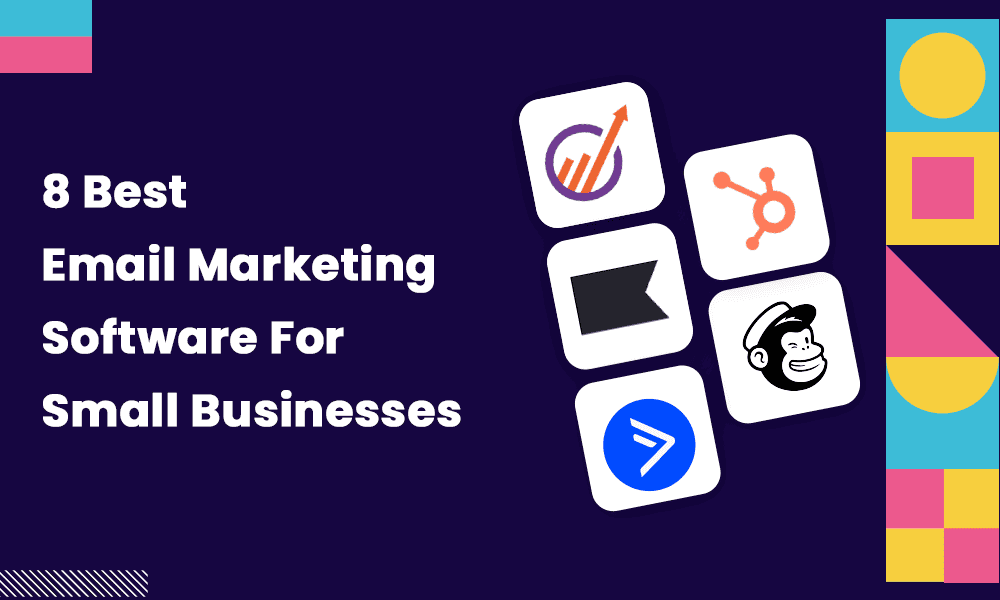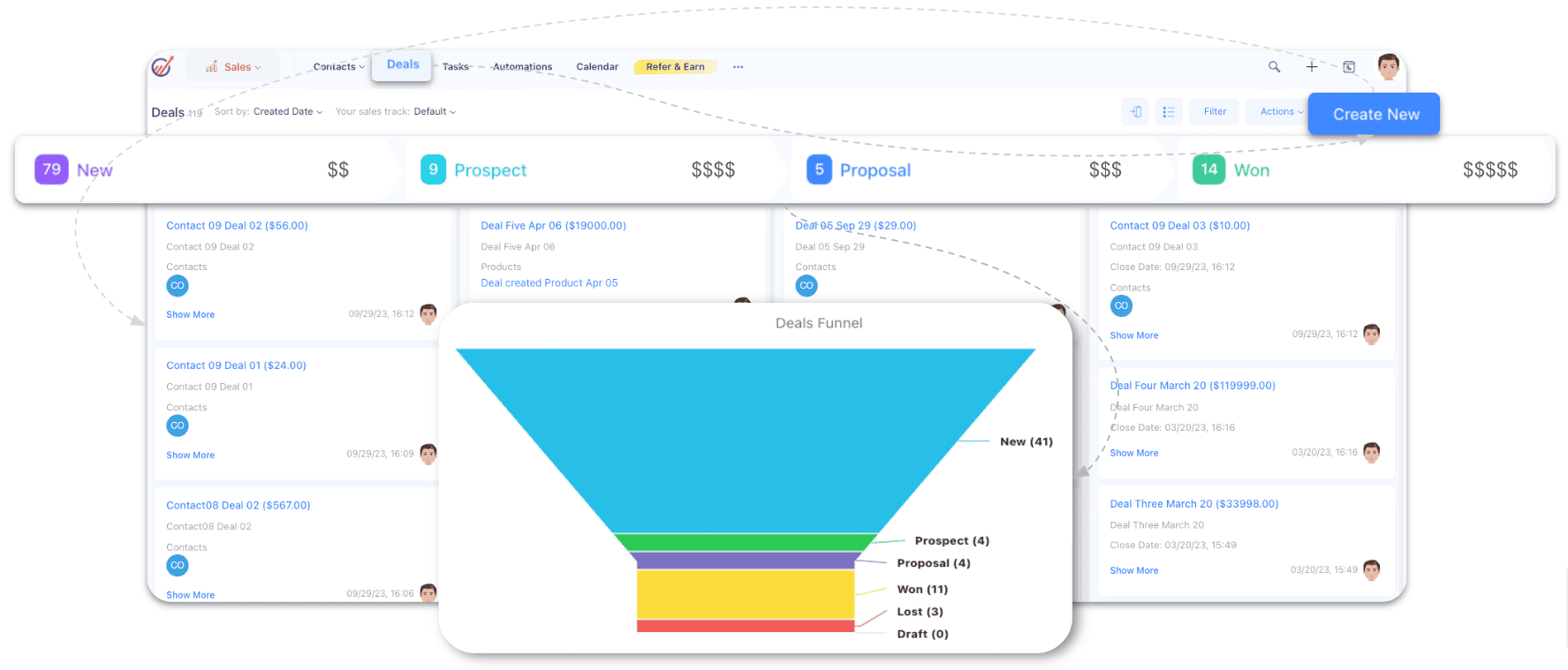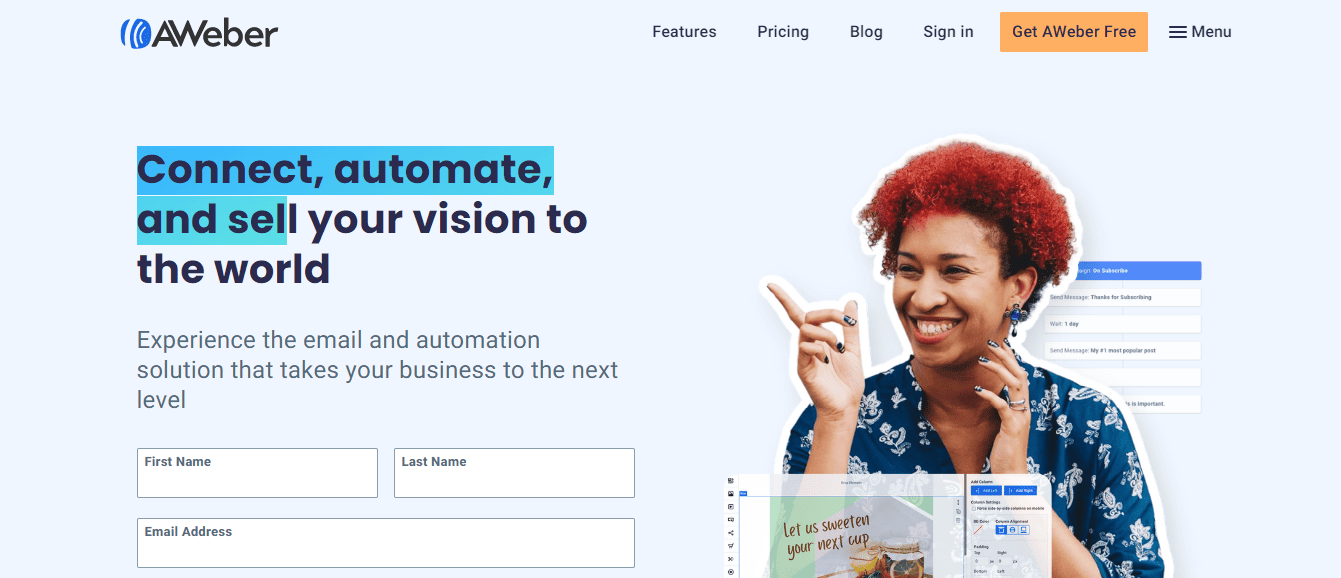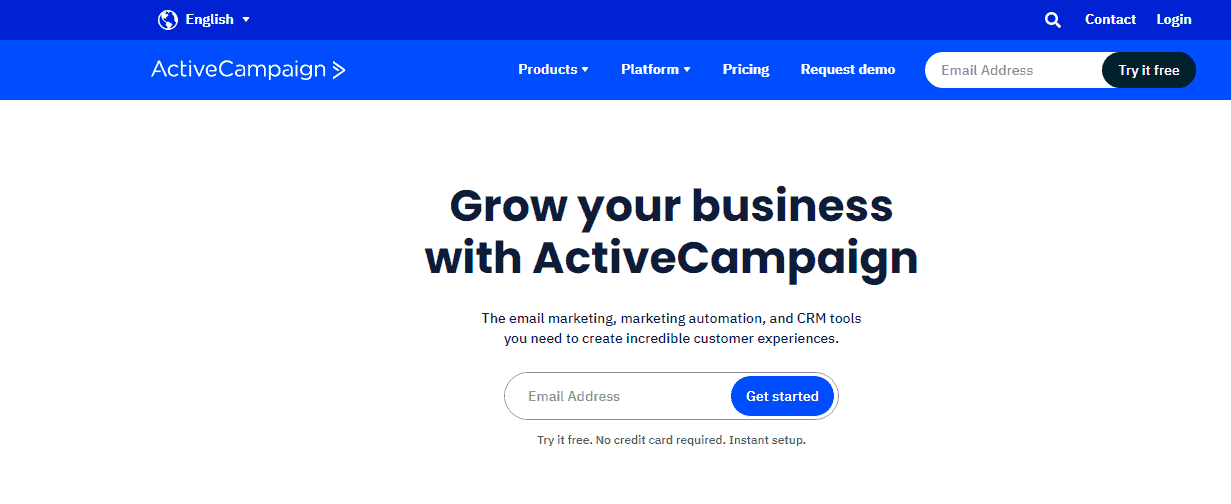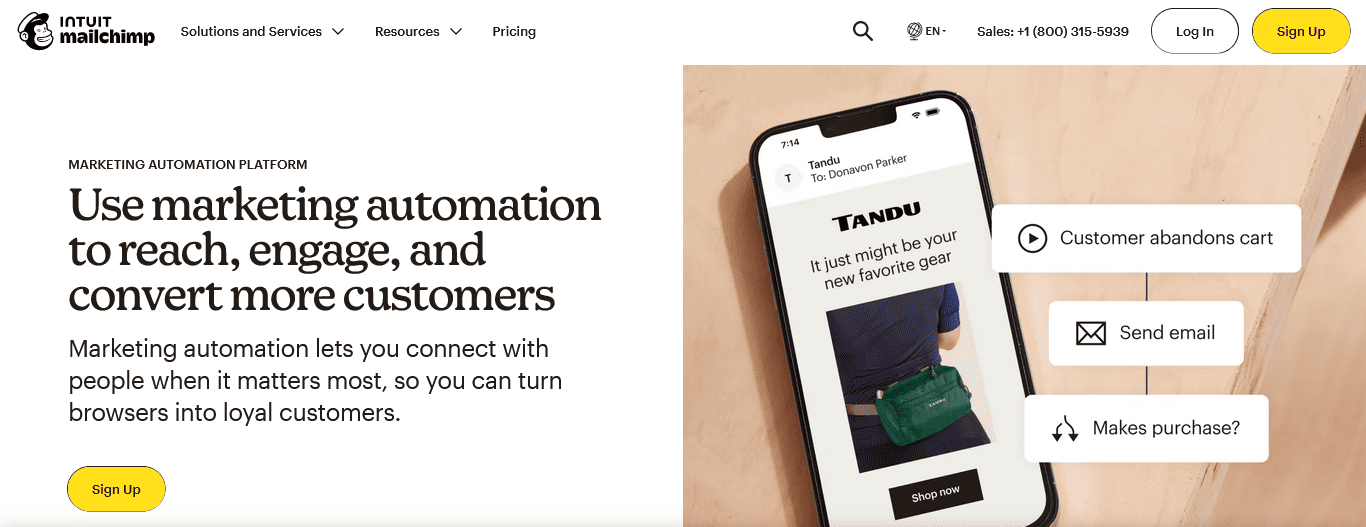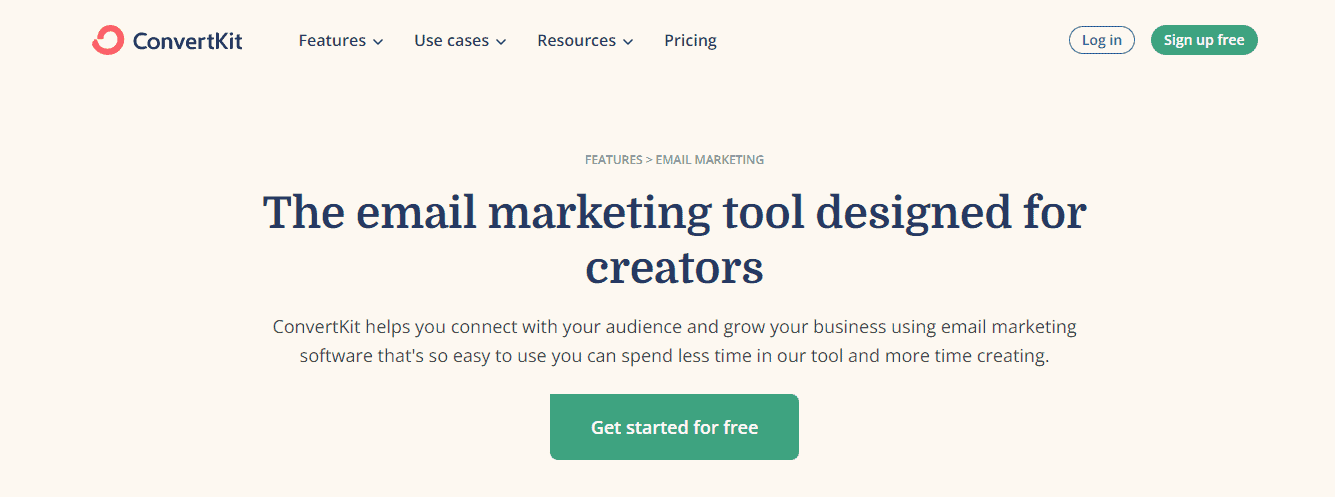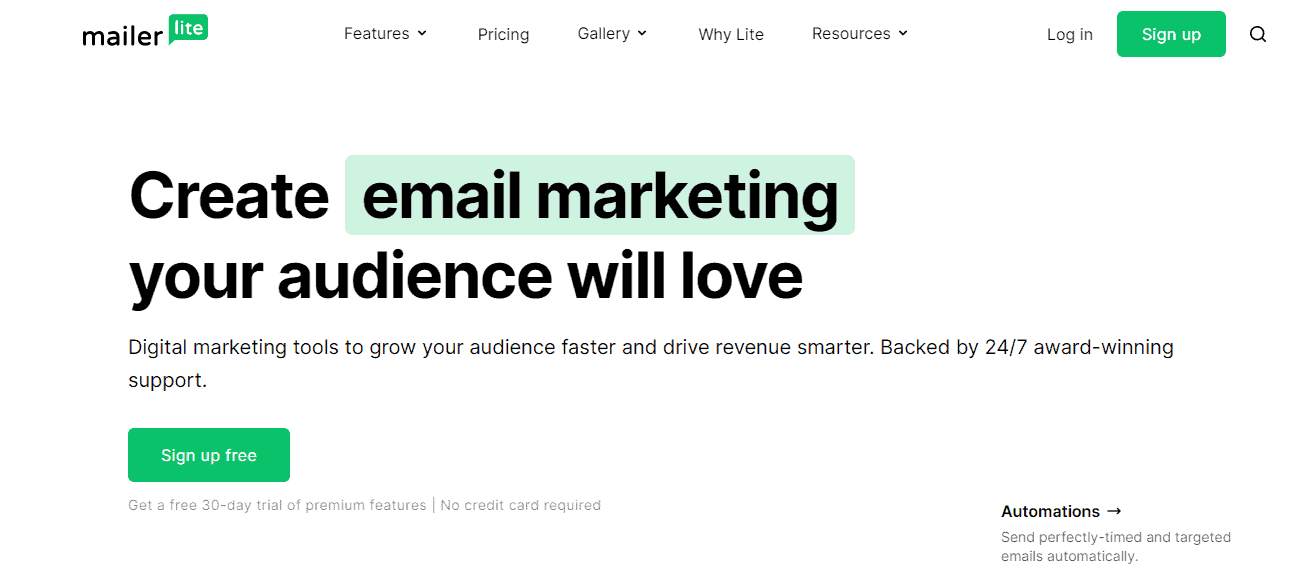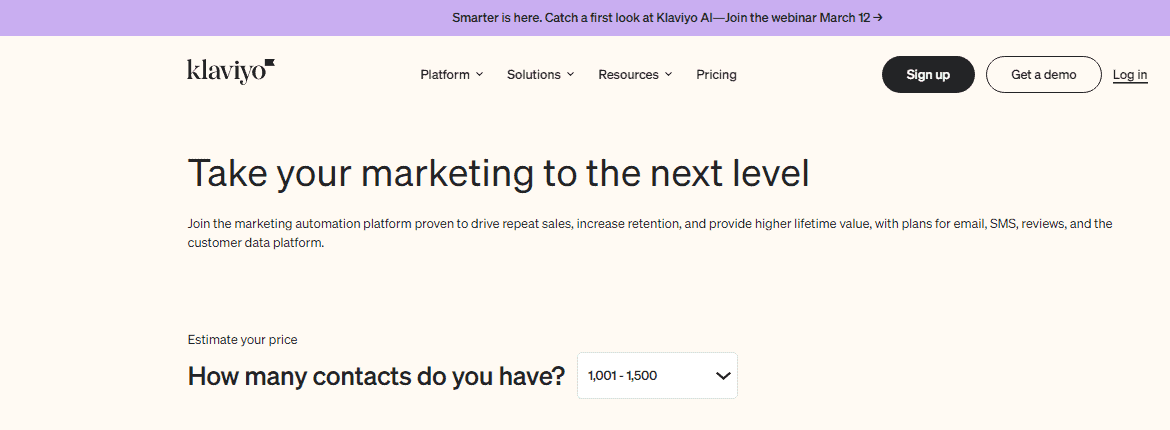Small businesses and startups can engage customers by delivering optimized emails and running targeted campaigns. However, this is a challenge for some companies, as they cannot afford enterprise-level email systems.
This leaves them with the option of using manual methods, which are time-consuming and boring.
In this blog post, we’ve shared eight affordable email marketing software for small businesses to launch powerful campaigns and improve conversions.
Since there are numerous email platforms, we’ve also shared advice on how to check which tools make sense for you.
Table of Contents
Top Email Marketing Software Options for Small Business
After extensive research and trials, I’ve selected nine of the best email marketing software for small businesses.
- EngageBay: A simple email marketing automation system with all-in-one CRM capabilities for sales, marketing, and service teams
- HubSpot: A robust all-in-one CRM with marketing automation features for businesses of all sizes
- AWeber: A simple digital marketing platform that supports web push notifications, an AI writing assistant, and email automation.
- ActiveCampaign: An advanced marketing automation tool to help marketers create better customer experiences
- Mailchimp: A robust marketing automation platform with content-optimizing capabilities and a unique customer journey builder
- ConvertKit: A unique email system that helps creators grow their audience, deliver engaging emails, and earn directly on the platform.
- MailerLite: A unique email marketing platform with digital marketing tools for website building, email verification, and eCommerce.
- Klaviyo: An eCommerce marketing automation platform that unifies your customer data across platforms, supporting email and SMS marketing
| Starting price | Free plan | Free trial | G2 Rating | Capterra Rating | |
| EngageBay | $11.95/month | Yes | 14-day free trial | 4.6 | 4.7 |
| HubSpot | $15/month | Yes | 30-day free trial | 4.4 | 4.5 |
| AWeber | $12.50/month | Yes | N/A | 4.2 | 4.4 |
| ActiveCampaign | $29/month | N/A | 14-day free trial | 4.6 | 4.5 |
| Mailchimp | $13/month | Yes | 30-day free trial | 4.5 | 4.4 |
| ConvertKit | $25/month | Yes | 14-day free trial | 4.7 | 4.4 |
| MailerLite | $13.50/month | Yes | 30-day free trial | 4.8 | 4.7 |
| Klaviyo | $45/month | Yes | 60-day free trial | 4.7 | 4.5 |
1. EngageBay
As an affordable all-in-one CRM system, EngageBay provides well-suited features for small businesses in multiple industries. In addition to the email marketing features, it also supports tailored capabilities for sales and support teams. This way, you can manage customer interactions across several channels from one dashboard.
EngageBay integrates seamlessly with third-party applications like Stripe, Zapier, SendGrid, MailGun, Twilio, Plivo, Shopify, etc.
Pricing
EngageBay uses a flexible pricing model with monthly, yearly, and biennial billing options. It has a free version and a 14-day free trial plan. The four pricing plans for EngageBay Marketing Bay are as follows.
- Free: $0/month for 250 contacts
- Basic: $11.95/month for 500 contacts
- Growth: $45.99/month for 3,000 contacts
- Pro: 73.59/month for 10,000 contacts
Key Features
- Email templates
- Landing pages and forms
- SMS marketing
- Lead scoring
- A/B testing
- Custom domain
- Marketing automation
- Web Analytics
- Contact segmentation
- Drip campaigns
- Push notifications
Ease of Use and Customer Support
EngageBay is an easy-to-use marketing system. Small businesses with inexperienced marketing teams can use the simple features to design automated workflows in minutes. The robust customization options allow you to create email, landing pages, and sign-up forms without coding.
EngageBay also offers a knowledge center with valuable resources to assist the onboarding process and help you carry out specific processes like data import/export, email creation, customer segmentation, etc. Moreover, their customer support team is responsive and proactive, willing to help you fix specific problems. It offers phone, email, and live chat support.
Pros
- It is an affordable option for small businesses
- It is easy to use
- Great customer support
Cons
- It lacks several advanced features
- Landing page templates are limited
- The reporting features need improvement
2. HubSpot
HubSpot is a popular cloud-based CRM system that offers robust features to help businesses optimize their operations, enhance customer communications, and improve conversions. The email marketing hub supports well-built capabilities for attracting and nurturing leads, as well as building profitable relationships to drive sales.
HubSpot supports integrations with Databox, Eventbrite, Typeform, Hotjar, Webflow, NeverBounce, Intercom, Unbounce, etc.
Pricing
HubSpot also has a flexible pricing structure for organizations of varying sizes. Small businesses can take advantage of the plans for individual and small teams. It supports monthly and annual billing options. Like EngageBay, it supports a free version and a 14-day free trial plan.
The three pricing tiers include:
- Free: $0/month
- Starter: $15/month
- Professional: $800/month
Key features
- Dynamic personalization
- List segmentation
- Custom reporting
- Landing pages
- Mobile Optimization
- Multi-language content creation
- A/B testing
- Email automation
- Omni-channel marketing automation
- Live chat
- Form automation
Ease of Use and Customer Support
HubSpot is a relatively advanced marketing software with complex processes and capabilities. However, it provides a robust knowledge center with quick-answer documents, community discussions, forums, courses, and user guides. This enables users to find answers and solutions to their queries.
There are multiple customization options that enable businesses to create unique templates that match their branding. HubSpot also supports chat, email, and phone support. These provisions eliminate the complexities around HubSpot’s marketing system.
Pros
- It provides access to an academy with robust educational resources
- It is an all-in-one CRM system for all things marketing, sales, and support
- It has a comprehensive app marketplace and supports integrations with several their-party applications
- It is a scalable system for growing businesses
Cons
- The pricing gets expensive too quickly
- A/B testing is not supported on lower packages
- You may need to pay for technical support
Read also: 14 Surprisingly Affordable HubSpot Alternatives in 2024
3. AWeber
Small businesses can use an email marketing tool like AWeber to keep customers engaged throughout the sales funnel. It offers web push notifications and basic eCommerce features to help creators create positive customer experiences. The marketing automation feature lets you build email sequences that can turn leads into customers.
AWeber integrates with programs like WordPress, PayPal, Squarespace, Webflow, Agile CRM, BigCommerce, etc.
Pricing
AWeber offers four major pricing plans that are well-suited for different organizations. The first three plans are more tailored to small businesses. It doesn’t support free trials but has a free forever plan with limited features. All four pricing tiers include:
- Free: $0/month
- Lite: $12.50/month
- Plus: $20/month
- Unlimited: $899/month
Key Features
- Landing page
- Email automation
- Reporting and analytics
- Web push notifications
- AI writing assistant
- Sign-up form builder
- eCommerce
- Drag and drop email builder
- Customizable email templates
Ease of Use and Customer Support
AWeber supports a drag-and-drop email builder with customization features to help you create custom emails that suit your branding style and tone. This makes it easy for non-tech-savvy marketers to create scalable campaigns across channels.
AWeber offers phone, live chat, and email support. They also have a support center with video tutorials and a knowledge base to help users build automated workflows and improve customer engagement.
Pros
- It is an affordable option for smaller businesses
- Responsive and friendly customer support
- You can send up to 3,000 emails for free
- It is a user-friendly and intuitive platform
Cons
- There’s no advanced analytics and split testing in the free plan
- The email formatting feature needs improvement
- Marketing automation features are limited
Read also: Beginner’s Guide to Understand Aweber Pricing, Limitations, and Features
4. ActiveCampaign
ActiveCampaign is an advanced email marketing system that helps businesses create pleasant customer experiences. With lead scoring and nurturing, you can identify the most profitable leads in your database. These insights can help you refine your strategies to focus on leads that will easily convert.
You can extend your functionalities by connecting ActveCampgin to third-party applications like Google Analytics, Unbounce, Shopify, Zapier, WooCommerce, etc.
Pricing
Like other email marketing systems, ActiveCampaign also offers four major pricing plans. However, there is no free version; the lowest plan starts at $29 monthly. Although, it allows a free trial period of 14 days to explore its features. The pricing tiers include:
- Lite: $29/month for 1,000 contacts
- Plus: $49/month for 1,000 contacts
- Professional: $149/month for 2.500 contacts
- Enterprise: $259/month for 2.500 contacts
Key Features
- Email automation
- Email personalization
- Landing pages and forms
- Site tracking
- Email templates
- Pop up builder
- Split testing
- Lead scoring
- Conversational marketing
- SMS marketing
- Audience segmentation
Ease of Use and Customer Support
ActiveCampaign is an advanced email marketing tool with a longer and steep learning curve. While it has useful onboarding and setup resources, beginners may find it difficult to navigate.
It, however, has a user-friendly design and a library of customizable templates for designing attractive emails. ActiveCampign offers phone, email, live chat, and social media support to answer your queries and fix possible issues.
Pros
- Advanced analytics and reporting
- Advanced workflow automation
- The split-testing feature allows you to test up to 5 emails at once
Cons
- It doesn’t have a free plan
- The email templates are limited
- Customer support needs improvement
Read also: ActiveCampaign Pricing and Comparison with Other Alternatives
5. Mailchimp
Mailchimp is a comprehensive marketing automation platform for small and large businesses. It offers robust features that enable digital marketers to attract, nurture, and convert leads to returning customers. The cloud-based marketing solution uses AI-powered features to improve email content while streamlining customer engagement.
Mailchimp has a robust integrations directory, allowing you to connect with apps like Wix, Stripe, Square, Shopify, Help Scout, Databox, etc.
Pricing
Mailchimp supports flexible pricing structures for different marketers based on their business goals and models. In addition to the four major pricing plans, it offers a Pay-As-You-Go plan that allows you to pay only for the credits you need.
Mailchimp offers a free forever plan and you can also try the paid plans for free for up to one month. All plans include:
- Free: $0/month for 500 contacts
- Essentials: $13/month for 1,500 contacts
- Standard: $22/month for 1,500 contacts
- Premium: $175/month for 1,500 contacts
Key Features
- Audience management
- Reporting and analytics
- Marketing automation
- A/B testing
- Customer journey builder
- Campaign manager
- Dynamic content
- Creative Assistant
- Content Studio
- Behavioral targeting
Ease of Use and Customer Support
Although Mailchimp is an advanced marketing tool, it is also a user-friendly platform that allows beginners and experienced marketers to deliver highly targeted and personalized campaigns. Like HubSpot, Mailchimp provides a comprehensive knowledge base to guide new users through all necessary processes.
Mailchimp offers chat, email, and phone support. It also has an AI-powered chatbot that provides quick answers to regular queries. However, dedicated and assisted onboarding support is only available on higher plans.
Pros
- Mailchimp is an advanced marketing automation platform
- It supports a one-month trial period and other affordable options for smaller businesses
- It is beginner-friendly
- It supports multivariate and A/B testing
Cons
- Phone support is only available on higher plans
- Email scheduling is not available on the free plan
- The free plan includes Mailchimp branding
Read also: How Does Mailchimp Pricing Compare With Competitors
6. ConvertKit
ConvertKit is a unique digital marketing tool designed to help creators (bloggers, musicians, artists, YouTubers, authors, etc.) build profitable relationships with their audiences. It allows businesses to collaborate with other creators, sell digital products, and earn from newsletters. With ConvertKit, you can grow your online community and solidify your relationship with your audience by delivering appropriate and relevant content.
ConvertKit integrates with Teachable, Shopify, Gravity Forms, Zapier, WPForms, Integrately, Patreon, etc.
Pricing
ConvertKit has a free plan and two paid plans for creators (blogger, podcaster, YouTuber, maker, course creator, freelancer, coach, etc.). The free trial period lasts for 14 days. The paid plans include:
- Newsletter: $0/month
- Creator: $25/month
- Creator Pro: $50/month
Key Features
- Email designer
- Visual automation
- Landing pages and forms
- Creator Network
- Paid recommendations
- Paid newsletters
- eCommerce
- Customer journey builder
- Pre-built automation templates
- Automated email funnels
- A/B testing
Ease of Use and Customer Support
ConvertKit has an intuitive interface and user-friendly design that is well-suited for online creators. The automation tools are relatively easy to use and set up. The drag-and-drop functionality allows marketers to design simple and attractive emails and engage with customers.
ConvertKit offers email and live chat support. It also provides a knowledge base and a creator community to allow users to learn from other creators, ask questions, and gain insights into industry trends.
Pros
- It is intuitive and easy to use
- It is a perfect email marketing option for digital creators
- It supports robust eCommerce features
Cons
- The analytics feature is basic
- The pricing is steep
- There is no phone support
Read also: ConvertKit Cons: 7 Drawbacks and What to Do About Them
7. MailerLite
MailerLite is an email marketing tool that allows businesses to build and launch targeted marketing campaigns. The platform provides tailored eCommerce features where brands can promote and sell digital products. MailerLite offers marketing features like an email builder, customizable templates, a free image library, A/B testing, etc.
MailerLite integrates with Tidio, LeadsTunnel, Figma, Stripe, ClickFunnels, Intercom, Magento, Drupal, Zoom, etc.
Pricing
MailerLite has four major pricing tiers for businesses of varying sizes. Like Mailchimp, it has a free plan with a 30-day trial period for premium plans. The paid plans include:
- Free: $0/month
- Growing Business: $13.50/month
- Advanced: $27/month
- Enterprise: Custom pricing, talk to sales
Key Features
- Custom HTML editor
- AI writing assistant
- Pre-built email templates
- Multivariate testing
- Drag-and-drop editor
- Landing pages, sign-up forms, and pop-ups
- Website builder
- Email verifier
- eCommerce
- Paid newsletter subscriptions
- Email automation
Ease of Use and Customer Support
Unlike some other tools, MailerLite is an easy-to-use email platform. It has a shorter learning curve and provides valuable onboarding resources and guides to help new marketers navigate the system. It also supports drag-and-drop design features and pre-built automated workflows to streamline campaign management processes.
MailerLite offers live chat and email support. You can also hire an expert, use the customer self-service center, or join the community to connect and interact with fellow marketers.
Pros
- MailerLite has great pre-built, customizable templates
- Customer support is responsive and helpful
- It is an affordable option for small businesses and startups
- It provides robust eCommerce features
Cons
- It lacks some advanced automation features
- There are no email templates on the free version
- The reporting feature needs improvement
Read also: MailerLite vs Mailchimp and Other Email Tools
8. Klaviyo
As an eCommerce marketing platform, Klaviyo allows online merchants to promote their products/services online while building solid customer relationships. It uses email marketing, SMS marketing, and mobile push notifications to engage and interact with customers, regardless of their platforms. Klaviyo is also a customer data platform that allows you to manage, store, and process customer data to provide insights for making data-driven business decisions.
The clud-based marketing tool integrates seamlessly with popular e-commerce platforms, such as Shopify, Magento, BigCommerce, and WooCommerce.
Pricing
Klaviyo is a well-suited tool for eCommerce merchants. The pricing plans are not as flexible as other email marketing tools in this article. Surprisingly, Klaviyo offers a free plan and a trial period of 60 days for all premium plans. The plans include:
- Free: $0/month
- Email: $45/month
- Email and SMS: $60/month
Key Features
- Contact segmentation
- Web forms
- Automated flows
- Reporting
- Benchmarks
- Klaviyo AI
- SMS marketing
- Mobile push
- Split testing
Ease of Use and Customer Support
Klaviyo is a user-friendly platform for online business owners. It may not be affordable for small businesses, but it supports advanced eCommerce features that allow companies to promote their products and drive sales. The easy-to-use builder lets you create attractive emails in minutes.
Klaviyo offers live chat and email support. It also provides a help center and a knowledge base with helpful resources. In the community forum, you can connect with other marketers to share insights and get help from Klaviyo experts.
Pros
- It supports advanced eCommerce features
- It is a user-friendly email marketing tool
- It has a robust reporting feature
Cons
- It is not an affordable option for small businesses
- Customer support needs improvement
- Customization options are limited
Read also: Top Klaviyo Alternatives: Propel Your eCommerce Business Growth
Key Factors to Consider in Email Marketing Software for SMBs
When choosing email marketing software, consider these factors.
1. Features and functionality
Different email tools offer robust features for diverse marketing operations. The platform you choose depends on your marketing strategy and the features you need to accomplish your business goals.
For example, you need an audience segmentation feature to group your audience into different segments based on predefined attributes. Also, if your marketing team lacks experience with email designing, you may need a tool with prebuilt templates or a drag-and-drop editor to simplify the email creation process.
2. Customer support
Sometimes, you may encounter technical issues when using your email marketing platform. Even if you don’t experience any technical faults, you may need answers to questions or specific guides through a process.
Customer service teams assist users through emails, live chat, chatbots, phone, or social media. Other channels are through knowledge bases and community forums. Before choosing a mailing platform, find out how their support center operates and see if it fits your business well.
3. Mobile optimization
Optimizing your email for mobile involves using responsive templates or designs that fit all devices, including mobile. According to Litmus, 41.6% of users access their emails on mobile – webmail and desktop accounts for 40.6% and 16.2% respectively.
If your email marketing tool offers mobile optimization functionalities, you can create more attractive emails for a wider audience across devices.
4. Ease of use
A user-friendly platform is an ideal option for small teams and beginners who may lack experience in using more advanced and sophisticated systems. Choosing an easy-to-use platform will simplify your email marketing operations, taking away the complexities of building automated workflows, designing emails, or creating contact segments.
5. Third-party integrations
You may run multiple business operations with diverse systems and technologies. One way to sync your customer data across these platforms is to adopt a tool that supports quick integration with third-party platforms. These connections ensure consistent data across platforms.
6. Pricing
This is, by far, one of the major factors small businesses should consider before selecting their preferred email marketing solution. Understanding the pricing tiers and how they fit your budget will help you choose a plan that allows you to scale in the long run.
In choosing your platform, identify the basic features you need and how they improve your marketing strategy. You can start with the free plan or trial to see how it fits your brand framework. You can upgrade to any plan if it’s a good fit, depending on your marketing needs and contact size.
7. Email deliverability
The goal of email marketing is to reach your audience regardless of their channels or platforms. Sometimes, spam filters trap incoming emails, preventing them from reaching the inbox. This happens when they see an email with suspicious patterns or messages.
Email marketing platforms generally offer unique systems that help you avoid spam filters, increasing your deliverability rate. Some platforms, however, do not support these features. So, choosing tools that enable you to write and send authentic emails from reliable providers is important.
Read also: 8 Powerful eCommerce Marketing Automation Tools
Bottomline
Finding a suitable and cost-effective email marketing solution for your small business can be challenging since you have a wide range of options with unique functionalities. Even more, finding a perfect fit that aligns with your goals and team capabilities is no easy feat.
For a small business, finding an affordable platform is key to maximizing your marketing budget while building automated workflows and targeted campaigns to improve audience engagement. We’ve outlined several affordable email systems with different features and pricing structures.
If you want to give EngageBay a go, create a free account, build your first automation workflow, and start your campaign. If you’re going to dive straight into the paid plans, you can start with the basic plan or upgrade to higher plans depending on your contact size.
Are you using any of these tools? Let us know in the comments how they help you simplify your workflows. If you have other tools not listed here, feel free to share them too!
Frequently Asked Questions
What is the best email marketing software for small businesses with tight budgets?
The most affordable email marketing software for small businesses include EngageBay, AWeber, MailerLite, Mailchimp, and HubSpot.
How can I ensure my emails don’t end up in the spam folder?
Here are tips to avoid spam filters:
- Prune/clean your email list regularly
- Improve your sender reputation
- Comply with data protection laws
- Personalize your email
- Authenticate your email
- Send personalized and engaging content
- Make it easy for users to unsubscribe
Can I use email marketing software if I have no technical skills?
Yes, email marketing tools provide easy-to-use, user-friendly features for launching highly personalized campaigns. They also offer training and support, with helpful resources to guide users through the process.
